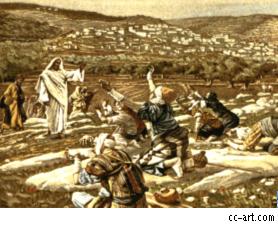Source of Collect: Very earliest of the Sacramentaries [440]. 1 Corinthans 13:13 "now abideth faith, hope, and charity... There are two petitions, to give us increase, and secondly to make us to love reminds us of Romans 6:17... being "obdeient from the heart" [Barbee and Zahl]. See reflection on this collect below relative to Augustine.
Micah vi. 1, Psalm 84, 85 | 74 , Galatians v. 16 & St. Luke xvii. 11

John Chrysostom
on Galatians
Ver. 16. "But I say, Walk by the Spirit, and ye shall not fulfil the lust of the flesh."
Here he points out another path which makes duty easy, and secures what had been said, a path whereby love is generated, and which is fenced in by love. For nothing, nothing I say, renders us so susceptible of love, as to be spiritual, and nothing is such an inducement to the Spirit to abide in us, as the strength of love. Therefore he says, "Walk by the Spirit and ye shall not fulfil the lust of the flesh:" having spoken of the cause of the disease, he likewise mentions the remedy which confers health. And what is this, what is the destruction of the evils we have spoken of, but the life in the Spirit? hence he says, "Walk by the Spirit and ye shall not fulfil the lust of the flesh."
Ver. 17. "For the flesh lusteth against the Spirit, and the Spirit against the flesh, for these are contrary the one to the other: that ye may not do the things that ye would."
Here some make the charge that the Apostle has divided man into two parts, and that he states the essence of which he is compounded to be conflicting with itself, and that the body has a contest with the soul. But this is not so, most certainly; for by "the flesh," he does not mean the body; if he did, what would be the sense of the clause immediately following, "for it lusteth," he says, "against the Spirit?" yet the body moves not, but is moved, is not an agent, but is acted upon. How then does it lust, for lust belongs to the soul not to the body, for in another place it is said, "My soul longeth," (Ps. lxxxiv. 2.) and, "Whatsoever thy soul desireth, I will even do it for thee," (1 Sam. xx. 4.) and, "Walk not according to the desires of thy heart," and, "So panteth my soul." (Ps. xlii. 1.) Wherefore then does Paul say, "the flesh lusteth against the Spirit?" he is wont to call the flesh, not the natural body but the depraved will, as where he says, "But ye are not in the flesh, but in the Spirit," (Rom. viii. 8, 9.) and again, "They that are in the flesh cannot please God." What then? Is the flesh to be destroyed? was not he who thus spoke clothed with flesh? such doctrines are not of the flesh, but from the Devil, for "he was a murderer from the beginning." (John viii. 44.) What then is his meaning? it is the earthly mind, slothful and careless, that he here calls the flesh, and this is not an accusation of the body, but a charge against the slothful soul. The flesh is an instrument, and no one feels aversion and hatred to an instrument, but to him who abuses it. For it is not the iron instrument but the murderer, whom we hate and punish. But it may be said that the very calling of the faults of the soul by the name of the flesh is in itself an accusation of the body. And I admit that the flesh is inferior to the soul, yet it too is good, for that which is inferior to what is good may itself be good, but evil is not inferior to good, but opposed to it. Now if you are able to prove to me that evil originates from the body, you are at liberty to accuse it; but if your endeavor is to turn its name into a charge against it, you ought to accuse the soul likewise. For he that is deprived of the truth is called "the natural man." (1 Cor. ii. 14.) and the race of demons "the spirits of wickedness." (Eph. vi. 12.)
Again, the Scripture is wont to give the name of the Flesh to the Mysteries of the Eucharist, and to the whole Church, calling them the Body of Christ. (Col. i. 24.) Nay, to induce you to give the name of blessings to the things of which the flesh is the medium, you have only to imagine the extinction of the senses, and you will find the soul deprived of all discernment, and ignorant of what it before knew. For if the power of God is since "the creation of the world clearly seen, being perceived through the things that are made," (Rom. i. 20.) how could we see them without eyes? and if "faith cometh of hearing," (Rom. x. 17.) how shall we hear without ears? and preaching depends on making circuits wherein the tongue and feet are employed. "For how shall they preach, except they be sent?" (Rom. x. 15.) In the same way writing is performed by means of the hands. Do you not see that the ministry of the flesh produces for us a thousand benefits? In his expression, "the flesh lusteth against the Spirit," he means two mental states. For these are opposed to each other, namely virtue and vice, not the soul and the body. Were the two latter so opposed they would be destructive of one another, as fire of water, and darkness of light. But if the soul cares for the body, and takes great forethought on its account, and suffers a thousand things in order not to leave it, and resists being separated from it, and if the body too ministers to the soul, and conveys to it much knowledge, and is adapted to its operations, how can they be contrary, and conflicting with each other? For my part, I perceive by their acts that they are not only not contrary but closely accordant and attached one to another. It is not therefore of these that he speaks as opposed to each other, but he refers to the contest of bad and good principles. (Compare Rom. vii. 23.) To will and not to will belongs to the soul; wherefore he says, "these are contrary the one to the other," that you may not suffer the soul to proceed in its evil desires. For he speaks this like a Master and Teacher in a threatening way.
"Let us therefore follow after the things which make for peace, and things wherewith one may edify another" [St. Paul's Epistle to the Romans 14:19]
* ORDO CENTURIONUM * IN HOC SIGNO VINCES * TIME DEUM ET OPERARE IUSTITIAM


